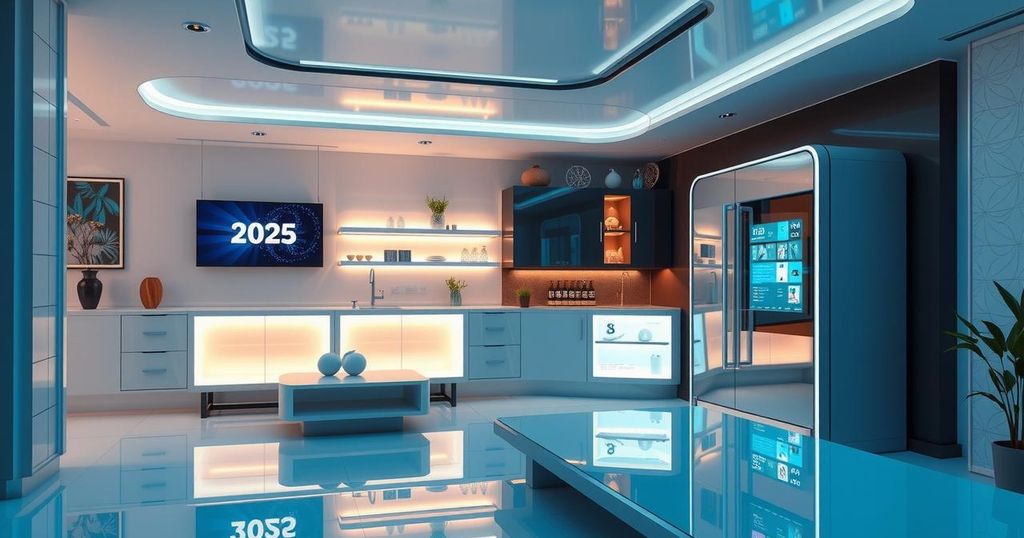AI
Tech
AMERICAN SOCIETY OF INTERIOR DESIGNERS, ARTIFICIAL INTELLIGENCE, CALIFORNIA, CONTROL, ENVIRONMENTAL SUSTAINABILITY, GREEN BUILDER MAGAZINE, GREEN BUILDER MEDIA, KHOI VO, LOS ANGELES, NONE, NORTH AMERICA, PRODUCT DEVELOPMENT, SARA GUTTERMAN, SMART CONTROL, SOUTHERN CALIFORNIA, TECHNOLOGY, UNITED STATES
Liam Kavanagh
0 Comments
Top Smart Home Innovations to Watch for in 2025
The article highlights predicted smart home innovations for 2025, featuring insights from industry leaders on areas such as control systems, smart lighting, furniture integration, water management, energy storage, and enhanced security technology. Each innovation focuses on improving convenience, efficiency, and safety in our homes, promising a transformative living experience ahead.
Are you someone who eagerly anticipates the newest technological advancements, or do you wait until they’ve proven their worth? Regardless of your approach, there’s excitement surrounding smart home innovations forecasted for 2025. From smart control systems to intelligent lighting and furniture, these advancements promise to enhance efficiency, comfort, and security in our everyday lives.
Experts, including Sara Gutterman and Khoi Vo, predict that 2025 will spotlight enhanced control technology. These central hubs will not only manage smart devices but also monitor aspects like energy, water, and air quality, ensuring optimal home performance and health, particularly in areas affected by wildfires.
The evolution of smart lighting and shading systems, as noted by Josh Christian and Rachel Hodgdon, will redefine our living environments. Tunable lighting can shift moods and align with our natural circadian rhythms, enhancing overall wellbeing. Automated shades will respond to the time of day, providing appropriate lighting conditions for both relaxation and productivity.
Mark Bryan highlights the exciting emergence of smart furniture, which integrates technology directly into everyday pieces. Imagine controlling your home’s lighting or temperature through a touch-sensitive coffee table. As smart furniture becomes more prevalent, its multifunctionality will transform our living spaces into interactive environments.
Smart water management technology, as discussed by Bill Darcy and Khoi Vo, is on the rise, addressing leak detection and resource conservation. Such systems not only promote responsible water usage but also serve as safeguards against catastrophic water issues, making them practical and essential.
Amanda Pendleton underscores the importance of whole-home batteries, especially amidst power disruptions. These backup systems not only provide energy security but become integral components of energy management through smart applications, enhancing comfort and sustainability within homes.
Lastly, Leslie Carothers introduces the Ring Always Home drone—a game-changer in home security. This innovative device allows homeowners to remotely monitor their property, ensuring peace of mind while offering insights into unusual activities. As we navigate the future, these technologies will undoubtedly reshape our interactions with our homes.
The article explores anticipated smart home innovations for 2025, focusing on insights from industry leaders across design and technology sectors. Key areas of innovation include control systems, lighting, furniture, water management, energy storage, and security technologies. This piece serves as a summary of a larger series that addresses the impacts of AI and smart technology trends, reflecting on historical predictions and their realizations in modern life.
As we look towards 2025, the integration of smart home technologies is set to revolutionize our living spaces. Innovations in control systems, lighting, furniture, and energy management will enhance our daily lives, promoting not only comfort and convenience but also environmental responsibility. With these advancements on the horizon, we can expect our homes to become more responsive, secure, and tailored to our needs.
Original Source: www.forbes.com




Post Comment